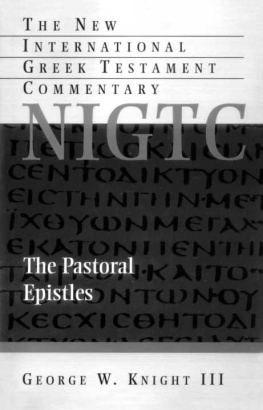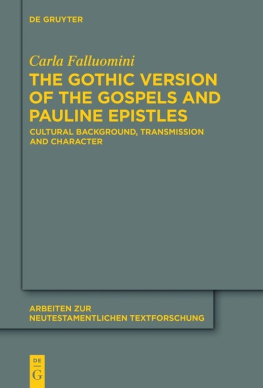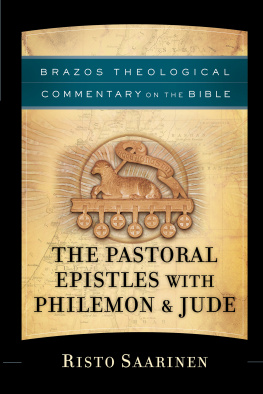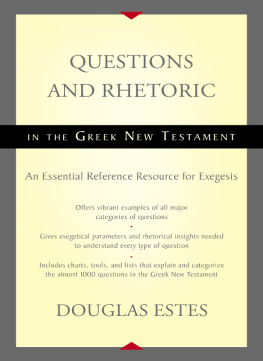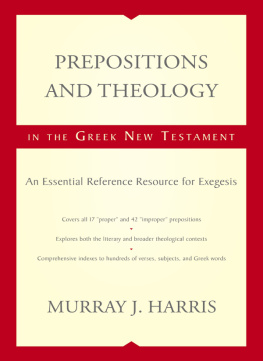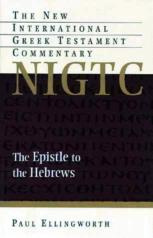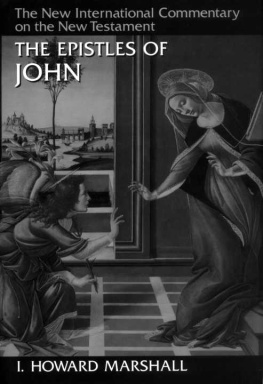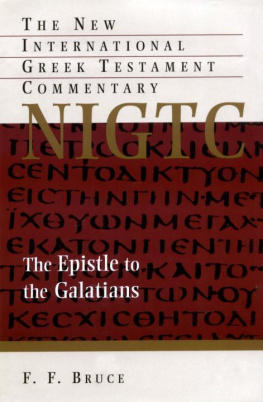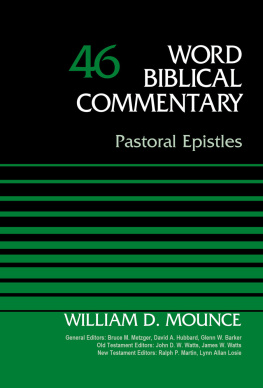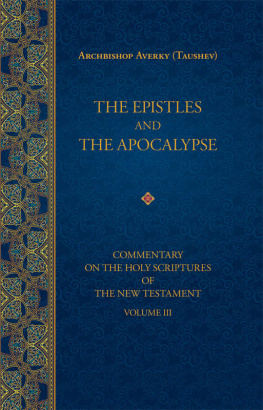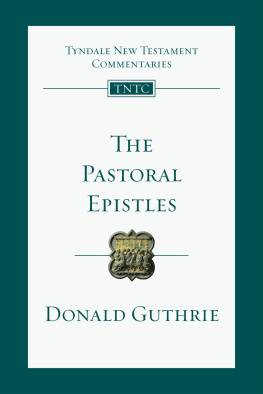George W. Knight III - The Pastoral Epistles: A Commentary on the Greek Text
Here you can read online George W. Knight III - The Pastoral Epistles: A Commentary on the Greek Text full text of the book (entire story) in english for free. Download pdf and epub, get meaning, cover and reviews about this ebook. year: 1996, publisher: William B Eerdmans Publishing Co, genre: Religion. Description of the work, (preface) as well as reviews are available. Best literature library LitArk.com created for fans of good reading and offers a wide selection of genres:
Romance novel
Science fiction
Adventure
Detective
Science
History
Home and family
Prose
Art
Politics
Computer
Non-fiction
Religion
Business
Children
Humor
Choose a favorite category and find really read worthwhile books. Enjoy immersion in the world of imagination, feel the emotions of the characters or learn something new for yourself, make an fascinating discovery.
- Book:The Pastoral Epistles: A Commentary on the Greek Text
- Author:
- Publisher:William B Eerdmans Publishing Co
- Genre:
- Year:1996
- Rating:3 / 5
- Favourites:Add to favourites
- Your mark:
- 60
- 1
- 2
- 3
- 4
- 5
The Pastoral Epistles: A Commentary on the Greek Text: summary, description and annotation
We offer to read an annotation, description, summary or preface (depends on what the author of the book "The Pastoral Epistles: A Commentary on the Greek Text" wrote himself). If you haven't found the necessary information about the book — write in the comments, we will try to find it.
The Pastoral Epistles: A Commentary on the Greek Text — read online for free the complete book (whole text) full work
Below is the text of the book, divided by pages. System saving the place of the last page read, allows you to conveniently read the book "The Pastoral Epistles: A Commentary on the Greek Text" online for free, without having to search again every time where you left off. Put a bookmark, and you can go to the page where you finished reading at any time.
Font size:
Interval:
Bookmark:

GREEK TESTAMENT COMMENTARY
Editors
I. Howard Marshall
and
W. Ward Gasque
Greek Text
by
GEORGE W. KNIGHT III
To all those who made this work possible and especially to my beloved wife, Virginia
xii
xiii
xvi
xxii
INTRODUCTION
COMMENTARY ON 1 TIMOTHY
COMMENTARY ON TITUS
COMMENTARY ON 2 TIMOTHY
INDEXES
While there have been many series of commentaries on the English text of the New Testament in recent years, it is a long time since any attempt has been made to cater particularly to the needs of students of the Greek text. It is true that at the present time there is something of a decline in the study of Greek in many traditional theological institutions, but there has been a welcome growth in the study of the New Testament in its original language in the new evangelical schools, especially in North America and the Third World. It is hoped that The New International Greek Testament Commentary will demonstrate the value of studying the Greek New Testament and help toward the revival of such study.
The purpose of the series is to cater to the needs of students who want something less technical than a full-scale critical commentary. At the same time, the commentaries are intended to interact with modern scholarship and to make their own scholarly contribution to the study of the New Testament. There has been a wealth of detailed study of the New Testament in articles and monographs in recent years, and the series is meant to harvest the results of this research in a more easily accessible form. The commentaries will thus include adequate, but not exhaustive, bibliographies. They will attempt to treat all important problems of history, exegesis, and interpretation that may arise.
One of the gains of recent scholarship has been the recognition of the primarily theological character of the books of the New Testament. This series will, therefore, attempt to provide a theological understanding of the text, based on historical-critical-linguistic exegesis. It will not, however, attempt to apply and expound the text for modem readers, although it is hoped that the exegesis will give some indication of the way in which the text should be expounded.
Within the limits set by the use of the English language, the series aims to be international in character; the contributors, however, have been chosen not primarily in order to achieve a spread between different countries but above all because of their specialized qualifications for their particular tasks. The supreme aim of this series is to serve those who are engaged in the ministry of the Word of God and thus to glorify his name. Our prayer is that it may be found helpful in this task.
I. Howard Marshall
W. Ward Gasque
I am thankful to the Editors for inviting me to contribute this volume to the series. Their patience over a number of years and their willingness to grant the time necessary is appreciated.
The format of the commentary series has been established by the preceding volumes, and I have sought to conform this volume to those already published. The text utilized as the basis for the commentary is that of the third edition (corrected) of The Greek New Testament published by the United Bible Societies (1983). I have followed the pattern of the commentary on Luke and given as full an account of the other occurrences of Greek words or phrases as would be helpful to the reader. On occasion I have listed all the occurrences in the NT, and this is indicated by a double asterisk * * after the word or phrase. At other times only the occurrences in the Pauline corpus or in the Pastoral Epistles are provided, and this is indicated by a single asterisk * after the abbreviation for Paul (Pl.) or for the Pastoral Epistles (PE). These listings will enable the reader to ascertain the usage of the word in the NT and to review the meaning and significance of the word in the NT. Since the building block of understanding is the word and its meaning, it is hoped that this will be an aid to the reader.
Like most exegetes, I am exceedingly indebted to those wordsmiths who have done a prodigious amount of work for the benefit of others. These have often been utilized but not specifically recognized because their contribution is so basic and well known. I have sought to rectify that injustice by constantly acknowledging my use of BAGD and other lexicons and theological dictionaries. If words are the building blocks, then the statement itself is the building that we are seeking to understand by entering into its meaning. For this aspect of the study the contributions of grammarians and other commentators are hereby gratefully acknowledged for the work that appears in the commentary proper. But since the task of the commentator is to comment on the text not on what others say about the text, I have not sought to constantly refer to those who hold differences of opinion but have sought rather to present arguments pro and con, and then to come to the most satisfactory conclusion as to the meaning of the text. However, at certain exegetical cruxes almost all the modem commentators are listed with an indication of the position taken. Similarly, not every known and available article on a subject or verse has been listed in the commentary (i.e., the bibliographical index card file has not been dumped into the book throughout), but rather a more selective (and, I hope, helpful) approach has been used. That is, the reader has been referred to those articles that contain a copious bibliography on the subject and to those articles that have provided the most help in understanding the matter under consideration. Between these two the reader will be adequately informed on the subject. In the Introduction, the interaction with the scholarly world has been more fully indicated and documented.
My debt to others is evident throughout the commentary, and I have sought to acknowledge that. Sometimes, of course, I have forgotten from whom I learned something or have come to the same conclusion through my own research. There have been so very many fine commentaries produced on the Pastorals that it would be odious to mention certain ones and thereby omit and neglect those not mentioned. But it would be derelict not to mention one person to whom I am most indebted in dealing with introductory questions regarding the Pastorals, particularly the question of authorship and especially those aspects relating to linguistics and pseudonymity. That person is Dr. Donald Guthrie. Even though his commentary in the Tyndale series (because of the nature of the series) is not technical, the Introduction and Appendix are gems of knowledge, as are his other works on the Pastorals and related subjects included in the bibliography. My indebtedness has been further increased by his gracious review of my Introduction and by the helpful comments and suggestions he has made. He must not, however, be held responsible for this writer's treatment of that subject, and particularly not for my treatment of Luke.
My indebtedness goes beyond individual scholars and their works. As indicated in the dedication, there are many who have helped make this volume a possibility. I take this opportunity to express my gratitude. I am very thankful to the board and to the administration of Covenant Theological Seminary for granting me two sabbaticals. The Libraries of Covenant Seminary and Concordia Seminary of St. Louis, and of Tyndale House and the University at Cambridge have been a rich source. I especially thank all the library staff at Covenant, particularly the former Librarian Dr. Joseph Hall (now my colleague at Knox), Mrs. Margaret Dye of Concordia, and Mr. David Deboys of Tyndale. To the Tyndale House I express my appreciation for a grant that made my stay in England possible, and for the use of an apartment and a study desk, which expedited my research and writing. A long overdue word of thanks goes to the Berean Class and to the Session of Central Presbyterian Church for their assistance during the first sabbatical. Friends whose private generosity should remain private as they wished it to be are nevertheless hereby thanked publicly for their kind support and en couragement. They know who they are, and I surely do. Former students, the Rev. Messrs. Lee Capper and Stephen Christian, Mrs. Gail MacNaughton, and Mr. Robert Wermuth, provided much valuable assistance in various ways, as did my daughter Jennie Rotherham in her work on the bibliography. My colleague, Dr. Robert Reymond, has graciously read certain portions of this work and his suggestions have been most helpful. The same goes for a previous NT colleague, Prof. Karl Cooper. Faculty secretaries Mrs. June Dare and Mrs. Eunice Lanz, the often unrecognized workers through whom a manuscript comes into its final form, have my deepest appreciation for their patient and skillful labors. I also want to express my great appreciation to Dr. John W. Simpson, Jr., of Eerdmans Publishing Co. for his gracious, skillful, and most helpful editing.
Font size:
Interval:
Bookmark:
Similar books «The Pastoral Epistles: A Commentary on the Greek Text»
Look at similar books to The Pastoral Epistles: A Commentary on the Greek Text. We have selected literature similar in name and meaning in the hope of providing readers with more options to find new, interesting, not yet read works.
Discussion, reviews of the book The Pastoral Epistles: A Commentary on the Greek Text and just readers' own opinions. Leave your comments, write what you think about the work, its meaning or the main characters. Specify what exactly you liked and what you didn't like, and why you think so.

